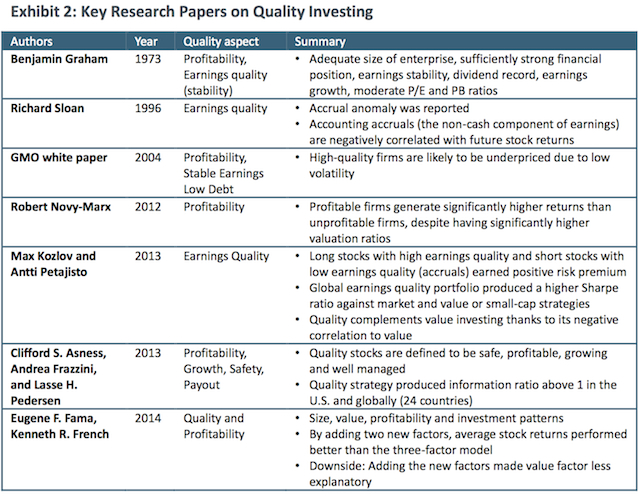The research on quality as an investment factor has been clear, but what exactly makes a ‘quality’ security is not.
MSCI found itself digging into the various definitions in building its quality-biased indexes, and, later, stacking its three passive factor vehicles against one another. Reviewing the landmark research on the relatively new investment factor—from Benjamin Graham’s 1973 work to that of GMO, AQR’s Cliff Asness, and finally Eugene Fama and Ken French (2014)—the firm found five prevailing dimensions of ‘quality’.
1. Profitability: Primarily calculated as a stock’s return on equity, or, less often, as return on assets, gross profitability, gross margin, or asset turnover.
2. Earning Quality: The persistency and predicability of earnings. Think blue chip, not shoot-the-lights-out performance.
3. Leverage: Balance sheets bogged down with debt count against companies hoping to earn the Fama and French seal of approval.
4. Asset Growth: Firms with conservative capital investments tend to outperform those with a tendency for “empire building,” research has shown.
5. Corporate Governance: Perhaps the squishiest of the five dimensions of ‘quality’, some investors value strong shareholder rights, board diversity, and other indicators of good governance as predictors of outperformance.
MSCI tested the various features, and settled on the first three for its quality-tilted indexes. The latter two—asset growth and corporate governance—required qualitative assessment, and proved weaker indicators of outperformance.
“The quality factor has historically provided a diversification benefit to other systematic factors,” MSCI concluded from its research review. “In addition, we found that both the quality and low volatility factors have exhibited defensive characteristics during volatile periods.”
Quality is an “important and credible factor,” the firm said, but warned investors to note it comes with its own tilts and quirks.
“Quality has a large-cap bias while minimum volatility tilts toward small-cap stocks,” MSCI wrote, “and thus the two approaches have produced varying performance during different market regimes.”
 Source: MSCI’s “Flight to Quality—Understanding Factor Investing”
Source: MSCI’s “Flight to Quality—Understanding Factor Investing”
